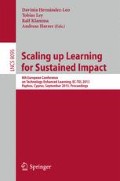Abstract
Recently we are urged to transform education into an evidence based profession, and promote scientific standards or practice. These calls are not new – they seem to emerge every few years. We do not argue with their goal, but we contend that the suitable frame of reference is the paradigm of design science, rather than the common metaphor of medical research. This paper proposes Design Inquiry of Learning as a projection of educational design science into a professional domain, and offers the Learning Design Studio as a pedagogical manifestation of this approach. The learning design studio is a collaborative, blended, project based framework for training educators in effective and evidence-based use of educational technology. We present its theoretical underpinnings, note its fundamental principles and structures, and review three independent cases where it has been trialed. The results show that this model is effective in developing learners’ theoretical knowledge as well as their practical skills, and allows them to link the two. However, it requires a considerable commitment of both learners and tutors, and may not be applicable in more casual settings.
Access this chapter
Tax calculation will be finalised at checkout
Purchases are for personal use only
Preview
Unable to display preview. Download preview PDF.
References
Anastopoulou, S., Sharples, M., Ainsworth, S., Crook, C., O’Malley, C., Wright, M.: Creating Personal Meaning through Technology-Supported Science Inquiry Learning across Formal and Informal Settings. International Journal of Science Education 34(2), 251–273 (2012)
Beetham, H., Sharpe, R.: Rethinking Pedagogy for a Digital Age: Designing for 21st Century Learning. Routledge (2013)
BERA: Research and Teacher Education: The BERA Inquiry (2013)
Cox, C., Harrison, S., Hoadley, C.: Applying the studio model” to learning technology design. Educating Learning Technology Designers: Guiding and Inspiring Creators of Innovative Educational Tools 145 (2008)
Clark, W., Luckin, R., Jewitt, C.: Deliverable D5.1 Methods and Specifications for TISL Components V1. NEXT-TELL Consortium, EU (2011)
Cross, S.: Evaluation of the OLDS MOOC curriculum design course: Participant perspectives, expectations and experiences, Technical report, the Open University (2013)
Cross, S., Conole, G., Clark, P., Brasher, A., Weller, M.: Mapping a landscape of learning design: Identifying key trends in current practice at the Open University. In: 2008 European LAMS Conference (2008)
Davies, P.: What is evidence-based education? British Journal of Educational Studies 47(2), 108–121 (1999)
DfE: The Importance of Teaching (White Paper). DfE, London (2010)
Goldacre, B.: Building Evidence into Education. DfE (2013), https://www.gov.uk/government/news/building-evidence-into-education
Hargreaves, D.: Teaching as a research-based profession: Possibilities and prospects (The teacher training agency lecture 1996). Educational Research and Evidence-based Practice, pp. 3–17 (2007)
James, M.: New (or not new) directions in evidence-based practice in education (2013)
Kali, Y., Ronen-Fuhrmann, T.: Teaching to design educational technologies. International Journal of Learning Technology 6(1), 4–23 (2011)
Kali, Y.: Collaborative knowledge building using a design principles database. IJCSCL 1, 187–201 (2006)
Korthagen, F.A.J., Kessels, J., Koster, B., Lagerwerf, B., Wubbels, T.: Linking practice and theory: The pedagogy of realistic teacher education. Lawrence Erlbaum (2001)
Laurillard, D.: The teacher as action researcher: Using technology to capture pedagogic form. Studies in Higher Education 33, 139–154 (2008)
Laurillard, D.: Teaching as a Design Science: Building Pedagogical Patterns for Learning and Technology (Paperback) - Routledge. Routledge (2012)
Mellar, H., Oliver, M., Hadjithoma-Garstka, C.: The role of research in institutional transformation, . In: Mayes, T., Bullen, P., Mellar, H., Oliver, M. (eds.) Transforming Higher Education through Technology-Enhanced Learning. Higher Education Academy, York (2009)
Mor, Y.: SNaP! Re-using, sharing and communicating designs and design knowledge using Scenarios, Narratives and Patterns. In: Luckin, R., Goodyear, P., Grabowski, B., Puntambekar, S., Winters, N., Underwood, J. (eds.) Handbook of Design in Educational Technology. Routledge (2013)
Mor, Y.: Context is what we take for granted: addressing context in design-centric teacher training (2011)
Mor, Y., Mogilevsky, O.: The Learning Design Studio: Collaborative Design Inquiry as Teachers’ Professional Development, Research in Learning Technology (forthcoming)
Mor, Y., Winters, N.: Design approaches in technology enhanced learning. Interactive Learning Environments 15, 61–75 (2007)
OECD: Lessons from PISA for the United States: strong performers and successful reformers in education (2011), http://www.oecd.org/dataoecd/32/50/46623978.pdf
Ronen-Fuhrmann, T., Kali, Y.: The role of concretization in acquiring design knowledge. In: Proceedings of the 9th International Conference of the Learning Science, vol. 1, pp. 468–475 (2010)
Ronen-Fuhrmann, T., Kali, Y., Hoadley, C.: Helping Education Students Understand Learning Through Designing. Educational Technology 48, 26–33 (2008)
Simon, H.A.: The Sciences of the Artificial, 3rd edn. The MIT Press, Cambridge (1996)
Voogt, J., Westbroek, H., Handelzalts, A., Walraven, A., McKenney, S., Pieters, J., De Vries, B.: Teacher learning in collaborative curriculum design. Teaching and Teacher Education 27(8), 1235–1244 (2011)
Author information
Authors and Affiliations
Editor information
Editors and Affiliations
Rights and permissions
Copyright information
© 2013 Springer-Verlag Berlin Heidelberg
About this paper
Cite this paper
Mor, Y., Mogilevsky, O. (2013). Learning Design Studio: Educational Practice as Design Inquiry of Learning. In: Hernández-Leo, D., Ley, T., Klamma, R., Harrer, A. (eds) Scaling up Learning for Sustained Impact. EC-TEL 2013. Lecture Notes in Computer Science, vol 8095. Springer, Berlin, Heidelberg. https://doi.org/10.1007/978-3-642-40814-4_19
Download citation
DOI: https://doi.org/10.1007/978-3-642-40814-4_19
Publisher Name: Springer, Berlin, Heidelberg
Print ISBN: 978-3-642-40813-7
Online ISBN: 978-3-642-40814-4
eBook Packages: Computer ScienceComputer Science (R0)

